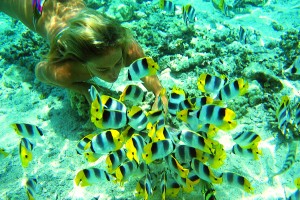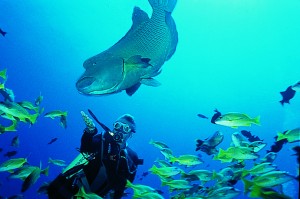
Photo Courtesy of tahiti Tourism
With a little instruction and practice, almost anyone can learn to float on the surface with mask and fins in one easy lesson. The warm, shallow waters around the island of Moorea are ideal for snorkeling year round, with a lack of strong currents and an abundance of marine life. There are many snorkeling spots close to the resorts and around the island. Complimentary gear is available at most resort dive shops for guest use. Tour companies will also provide all necessary equipment.

Photo Courtesy of Tahiti Tourism
Scuba diving is also available for certified divers. I know that resorts often promote introductory dives and on site programs. As a certified diver myself, I advise you to enroll in a full course in your home city at your own pace and comfort level beforehand. To be relaxed and ENJOY the experience, it is important that you are familiar with the equipment and procedures before attempting a first dive in open water in an unknown location. I have seen what can happen when a first time diver becomes overwhelmed and panics 25 feet under the surface. Be fully prepared or choose an alternative.
An interesting and intermediate option that you might want to try is snuba. This invloves walking along the lagoon bottom in a diving helmet with an attached air hose. You are fully immersed under water yet able to move slowly & breath fairly normally. The other advantage is that no formal training is required.
I will discuss scuba diving in more detail when we travel to the Tuamotus islands of Tahiti another month. The diving there is just exceptional and in a class all its own.
Tomorrow, I will introduce you to someone very special who will take us to an underwater grotto. We will have time to snorkel between submerged giant tikis (statues) and meet its resident 5 foot barracuda. And there’s even more to see & do before we return to our home base.

Photo Courtesy of Tahiti Tourism
With a little instruction and practice, almost anyone can learn to float on the surface with mask and fins in one easy lesson. The warm, shallow waters around the island of Moorea are ideal for snorkeling year round, with a lack of strong currents and an abundance of marine life. There are many snorkeling spots close to the resorts and around the island. Complimentary gear is available at most resort dive shops for guest use. Tour companies will also provide all necessary equipment.

Photo Courtesy of Tahiti Tourisme
Scuba diving is also available for certified divers. I know that resorts often promote introductory dives and on site programs. As a certified diver myself, I advise you to enroll in a full course in your home city at your own pace and comfort level beforehand. To be relaxed and ENJOY the experience, it is important that you are familiar with the equipment and procedures before attempting a first dive in open water in an unknown location. I have seen what can happen when a first time diver becomes overwhelmed and panics 25 feet under the surface. Be fully prepared or choose an alternative.
An interesting and intermediate option that you might want to try is snuba. This invloves walking along the lagoon bottom in a diving helmet with an attached air hose. You are fully immersed under water yet able to move slowly & breath fairly normally. The other advantage is that no formal training is required.
I will discuss scuba diving in more detail when we travel to the Tuamotus islands of Tahiti another month. The diving there is just exceptional and in a class all its own.
Tomorrow, I will introduce you to someone very special who will take us to an underwater grotto. We will have time to snorkel between submerged giant tikis (statues) and meet its resident 5 foot barracuda. And there’s even more to see & do before we return to our home base.




